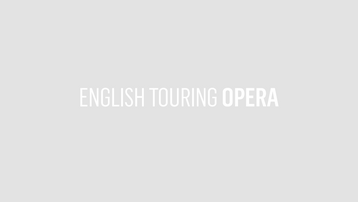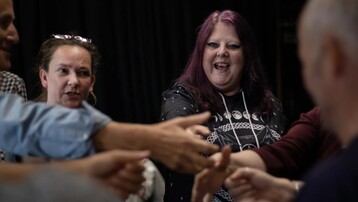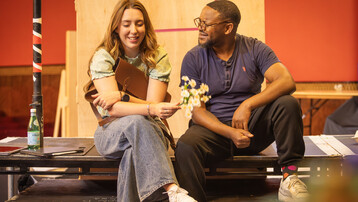News Story
Ahead of the premiere of Blond Eckbert: Double Bill, enjoy an exclusive look at composer Judith Weir's music with Conductor Gerry Cornelius.
What makes Judith Weir such a special composer? Her trademarks, innovations?
Apart from her astonishing creative prowess and technical skill, Judith Weir seems to have such a wide set of interests, ranging from folk tales, literature, religious imagery and immersion in other cultures (and many more) that she has written landmark pieces for most of the musical and theatrical genres. Her musical language has qualities of both the familiar and the newly-invented which is why I think it is so richly communicative. The result is music that is theatrical, narrative-driven and often gripping through either its propulsion or its sheer beauty. Someone said that she “has a knack of making simple musical ideas appear freshly mysterious” which I think is absolutely true.
What is your own relationship with her music?
I first heard Judith’s music in the Christmas carol service from Kings College, Cambridge in the late 1980s where her wonderfully quirky carol “Illuminare Jerusalem” was premiered - after which I was hooked on her music all through my studies. Later I worked on two of her very large-scale works; the premiere of her opera “Miss Fortune” for the Bregenz Festival and her cantata “We Are Shadows” for the National Youth Orchestra and Choirs. I had a wonderful experience with these very exciting and beautiful scores not least because, through these, I got to meet Judith in person.
What makes Blond Eckbert such an exciting piece?
The story and the music are both gripping and when I first saw the premiere of this version in 2006 the impact of it was really strong. I was suitably disturbed by its strangeness, intensity and darkly psychological content. I love how it seems to subtly hide as much as it reveals leaving you wanting to hear it again and again.
Do you have any favourite passages?
There are so many arresting moments in this short opera! I’m always struck by the last scene in Act 1, called ”Strohmian”, in which the music mirrors the principal couple’s mounting paranoia and panic which becomes a terrifying cliff-hanger at the end of the first act. And then, in a masterstroke, Judith follows this with quite the most ravishing music in the Prelude to Act II - representing the landscape and the Bird’s exquisitely beautiful song – itself a lull before the next storm…
Why the pocket version?
In a very foresighted move, Patrick Bailey & John Fulljames of the specialist contemporary opera company, The Opera Group, approached Judith to make a smaller-scaled version of the original full version she wrote for ENO. She not only pared down the original’s huge forces but also made some moderate changes to the length of the opera. She told me it took her a full year to achieve this reduction but believes that the opera gains many things as a result. Her final choices result in a combination of instruments not matched in any other opera I know and is startlingly effective. As an aside - I love the term Pocket Version…
This is only the second performance of this opera in the UK - why so few in your opinion?
I am indeed surprised by this statistic, in fact I think probably maybe more than that as I have seen three productions myself (admittedly including ours). But I know that Blond Eckbert has been played very extensively abroad and is one of the most played contemporary chamber operas that I know. I think that the UK has been at the forefront of championing contemporary opera for some while and it might be that our companies have such a strong mission to program new work that the option to revisit recent ones just can’t be squeezed in. This is regrettable but it’s therefore great that ETO can bring this truly masterful piece to its widest and most diverse audience ever.
What more could be done to promote contemporary opera in the UK?
In some ways today it is the smaller and more experimental companies that are the leaders for the nurturing of new opera on subjects that reflect the crucial issues of our contemporary world – and supporting them is paramount. But mercifully the bigger companies still manage to continue their ambitious programmes of commissioning new full-scale works. Also, most education centres and conservatoires increasingly programme and commission new work which is fantastic and has to be the most important area to preserve, for the composers, performers and audiences of the future.


